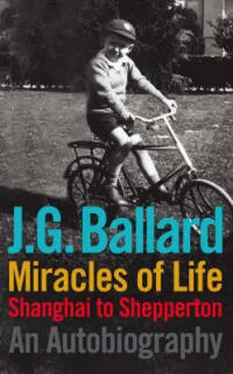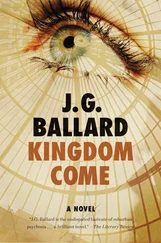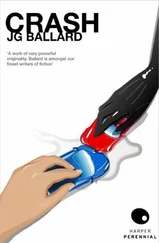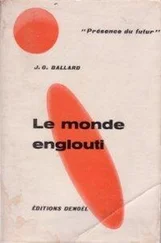The first English novelist I met and got to know closely was Kingsley Amis. He had reviewed The Drowned World in extremely generous terms in the Observer , and was the first to introduce me to an audience beyond science fiction. He was then at the peak of his Lucky Jim fame, a highly intelligent, witty and glamorous figure who was pleasantly affable to anyone whose writing he liked. He reviewed science fiction in an open-minded way, maintaining that the best of the genre deserved to be taken seriously in the same way as jazz at its best.
After Victor Gollancz’s death Amis joined Jonathan Cape, then the most fashionable publishing house in London, and effectively took me with him. Cape published me for the next twenty years, in some ways a mixed blessing. I knew Amis closely from 1962 to 1966, and often had lunch with him in Soho. He was a great drinking companion – the food served at Manzi’s or Bertorelli’s was little more than an appetiser for the real sustenance in the form of numerous bottles of claret. He was a great raconteur and brilliant mimic with a number of set-piece performances, such as President Roosevelt’s wartime short-wave broadcasts, with isolated phrases like ‘arsenal of democracy’ and ‘tanks, guns, planes’ emerging from a blare of static.
Amis had just freed himself from his teaching post at Cambridge, and was in very good humour, but sadly this darkened over the next ten years as he grew dissatisfied with everything. I think he knew that his first book had been his best, and this led to heavier and heavier drinking, coupled with a certain social stiffness. Where once he was happy to drink beer in pubs, he now insisted on going to hotels, where he would order pink gins in an over-elaborate way.
By the last years of his life his hates were in full flow – Americans, Jews, the French and their entire culture, hippies and, for some unfathomable reason, Brigid Brophy. In the 1970s we once looked down during lunch from a window of the Café Royal at a protest march going along Regent Street. Amis began to tremble and shake. ‘Jim, what are they? What are they?’ He was almost speechless as he surveyed the column of cheerful young people with their anti-nuclear banners. To be fair to Amis, he had been through the war, and served in the army in northern Europe. While he had never taken part in combat, he told me, he had seen plenty of bodies by the roadside as the British forces advanced, and felt that he knew far more about the realities of war and peace than the soft-cheeked protesters in the street below us.
Amis disliked literary pretension (as he saw it) of any kind and was a remarkably astute judge of fiction, which I can say even though he later disliked a good part of my own writing. He believed in the 19th-century virtues of well-drawn characters, credible dialogue and a strong story. No novel should ever comment on itself, but sustain the illusion that it is enacting real events.
I met his son Martin when he was 14 – like many of us, at heart, unchanged by the decades – and in later years Kingsley always seemed proud of Martin’s success. ‘Great stuff,’ he would say about Martin’s latest novel, and I saw none of the meanness or grudging praise now credited to him.
Undoubtedly, Amis did have his mean streak, and was one of those people who feel a need to break with all their friends. His treatment of women could be crude. One of his former lovers, a student during his Swansea teaching days, told me that he would regularly order his wife into the nearby park when it was time for his ‘tutorial’ with her. There the novelist’s wife would push the pram with the children until he drew the bedroom curtains and signalled that she could return.
Family life has always been very important to me, far more important, I suspect, than to people of my parents’ generation. I often wonder why many of them bothered to have children at all, and assume that it must have been for social reasons, some ancient need to enlarge the tribe and defend the homestead, just as some people keep a dog without ever showing it affection, but feel secure when it barks at the postman.
Perhaps I belong to the first generation for whom the health and happiness of their families is a significant indicator of their own mental well-being. The family and all the emotions within it are a way of testing one’s better qualities, a trampoline on which one can leap ever higher, holding one’s wife and children by their hands.
I enjoyed being married, the first real security I had ever known, and easily coped with the strains and early struggles of a writer’s life. I enjoyed being a father who was closely involved with his children, pushing them in their pram through the streets of Richmond and Shepperton, and later driving with them across Europe to Greece and Spain. Children change so rapidly, learning to grasp the world and learning to be happy, learning to understand themselves and shape their own minds. I was fascinated by my children and still am, and feel much the same way about my four grandchildren. I have always been very proud of my children, and every moment I spend with them makes the whole of existence seem warm and meaningful.
In 1963 Mary was in good health, but needed her appendix removed. She recovered slowly from the operation at Ashford Hospital, and perhaps her resistance was affected, or some infection lingered. She was keen to go on holiday, and the following summer we drove to a rented flat at San Juan, near Alicante. For a month all went well, and we enjoyed ourselves in the bars and beach restaurants. It was the kind of holiday where the high point is the day Daddy fell off the pedalo. But Mary suddenly became ill with an infection, and this rapidly turned into severe pneumonia. Despite the local doctor, a male nurse (the practicante) who was with her constantly, and a consultant from Alicante, she died three days later. Towards the end, when she could barely breathe, she held my hand and asked: ‘Am I dying?’ I’m not sure if she could hear me, but I shouted that I loved her until the end. In the final seconds, when her eyes were fixed, the doctor massaged her chest, forcing the blood into her brain. Her eyes swivelled and stared at me, as if seeing me for the first time.
We buried her in the small Protestant cemetery in Alicante, a walled stone yard with a few graves of British holidaymakers killed in yachting accidents. A Protestant priest came to see me the previous day, a decent and kindly Spaniard who did not seem upset when I declined to pray with him. I can still hear the sound of the iron-wheeled cart carrying the coffin across the stony ground. The priest conducted a short service, watched by myself and the children, and a few English residents from our apartment building. Then the priest rolled up his sleeves, took a spade and began to shovel the soil onto the coffin.
In late September, when San Juan beach was deserted and the cold air was beginning to come down from the mountains, we left the now-empty apartment building and set off on the long drive back to England.
From the start I was determined to keep my family together. Mary’s sisters and mother, who were an enormous help over the coming years, offered to share bringing them up. But I felt that I owed it to Mary to look after her children, and I probably needed them more than they needed me.
I did my best to be both mother and father to them, though it was extremely rare in the 1960s to find single fathers caring for their children. Many people (who should

Fay, Jim and Beatrice at home with me in 1965 .
Читать дальше







